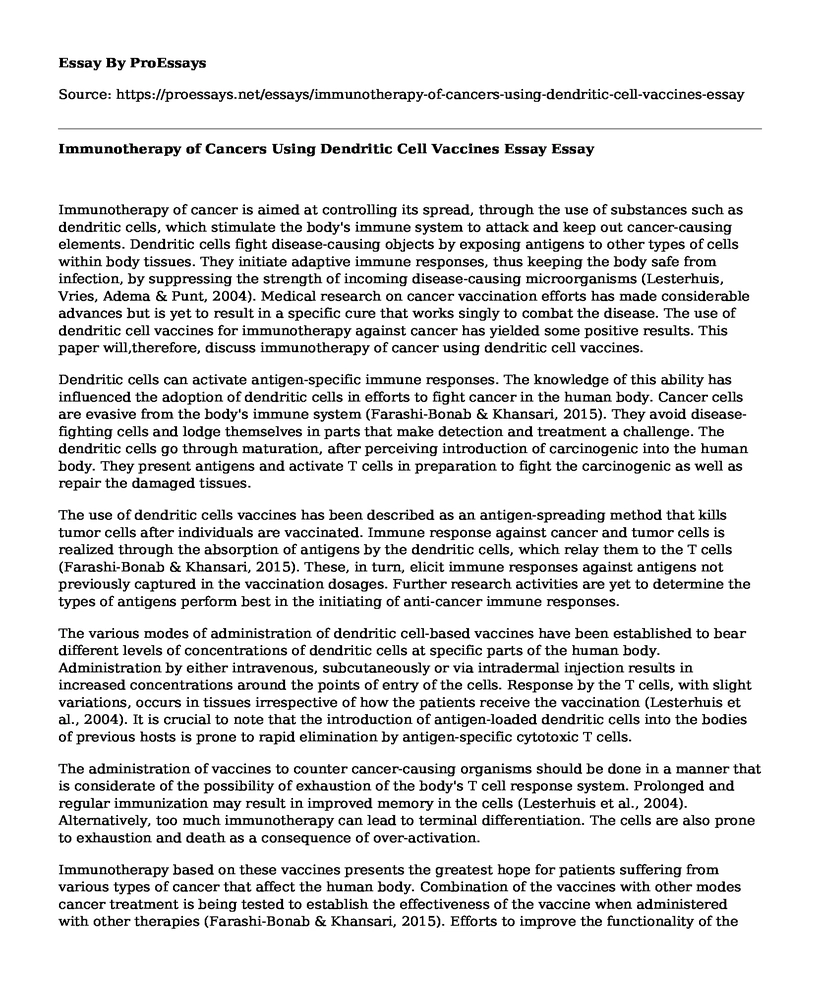Immunotherapy of cancer is aimed at controlling its spread, through the use of substances such as dendritic cells, which stimulate the body's immune system to attack and keep out cancer-causing elements. Dendritic cells fight disease-causing objects by exposing antigens to other types of cells within body tissues. They initiate adaptive immune responses, thus keeping the body safe from infection, by suppressing the strength of incoming disease-causing microorganisms (Lesterhuis, Vries, Adema & Punt, 2004). Medical research on cancer vaccination efforts has made considerable advances but is yet to result in a specific cure that works singly to combat the disease. The use of dendritic cell vaccines for immunotherapy against cancer has yielded some positive results. This paper will,therefore, discuss immunotherapy of cancer using dendritic cell vaccines.
Dendritic cells can activate antigen-specific immune responses. The knowledge of this ability has influenced the adoption of dendritic cells in efforts to fight cancer in the human body. Cancer cells are evasive from the body's immune system (Farashi-Bonab & Khansari, 2015). They avoid disease-fighting cells and lodge themselves in parts that make detection and treatment a challenge. The dendritic cells go through maturation, after perceiving introduction of carcinogenic into the human body. They present antigens and activate T cells in preparation to fight the carcinogenic as well as repair the damaged tissues.
The use of dendritic cells vaccines has been described as an antigen-spreading method that kills tumor cells after individuals are vaccinated. Immune response against cancer and tumor cells is realized through the absorption of antigens by the dendritic cells, which relay them to the T cells (Farashi-Bonab & Khansari, 2015). These, in turn, elicit immune responses against antigens not previously captured in the vaccination dosages. Further research activities are yet to determine the types of antigens perform best in the initiating of anti-cancer immune responses.
The various modes of administration of dendritic cell-based vaccines have been established to bear different levels of concentrations of dendritic cells at specific parts of the human body. Administration by either intravenous, subcutaneously or via intradermal injection results in increased concentrations around the points of entry of the cells. Response by the T cells, with slight variations, occurs in tissues irrespective of how the patients receive the vaccination (Lesterhuis et al., 2004). It is crucial to note that the introduction of antigen-loaded dendritic cells into the bodies of previous hosts is prone to rapid elimination by antigen-specific cytotoxic T cells.
The administration of vaccines to counter cancer-causing organisms should be done in a manner that is considerate of the possibility of exhaustion of the body's T cell response system. Prolonged and regular immunization may result in improved memory in the cells (Lesterhuis et al., 2004). Alternatively, too much immunotherapy can lead to terminal differentiation. The cells are also prone to exhaustion and death as a consequence of over-activation.
Immunotherapy based on these vaccines presents the greatest hope for patients suffering from various types of cancer that affect the human body. Combination of the vaccines with other modes cancer treatment is being tested to establish the effectiveness of the vaccine when administered with other therapies (Farashi-Bonab & Khansari, 2015). Efforts to improve the functionality of the vaccine in the hope of finding a long-term preventive treatment are encouraged as cancer has resulted in a worrying increase in mortality rates across the globe.
Conclusion
In conclusion, the dendritic cell vaccines offer a possibility of medical researchers making advances towards the production of a fully-functional preventive mode of treatment. Its effectiveness in responses elicited by the cells is low in severe cases of cancers. So far, immunotherapy has availed an option of treatment previously not available in the medical world. Cancer has become a global disaster, and therefore, efforts such as immunotherapy to counter its effects should be encouraged and adopted, to tame its devastating impact on human beings.
References
Farashi-Bonab S, & Khansari, N. (2015) Dendritic cell vaccine and its application in cancer therapy. International Journal of Vaccines, 1(1): 00002.
Lesterhuis, W., Vries, I., Adema, G., & Punt, C. (2004). Dendritic cell-based vaccines in cancer immunotherapy: An update on clinical and immunological results (15th ed., pp. 1-7).
Nijmegen: Department of Medical Oncology and 2 Tumor Immunology, University Medical Center St Radboud. Retrieved from https://pdfs.semanticscholar.org/1b07/1412cac5169eed682566fdce67e9a58021d0.pdf
Cite this page
Immunotherapy of Cancers Using Dendritic Cell Vaccines Essay. (2022, May 26). Retrieved from https://proessays.net/essays/immunotherapy-of-cancers-using-dendritic-cell-vaccines-essay
If you are the original author of this essay and no longer wish to have it published on the ProEssays website, please click below to request its removal:
- Problem Solution Essay on Unhealthy Eating Habit
- Research Paper on Grassroots International Hospital
- Essay on Value of Critical Thinking in the Nursing Profession
- Essay Example on Organ Trafficking in Egypt: They Locked Me In and Took My Kidney
- Essay Sample on Primary Health Nursing: Knowledge & Skills
- ACCHS: Achieving Equality for First Nations People Through Equity - Essay Sample
- Public Health Care: Debates, Challenges & Solutions - Essay Sample







